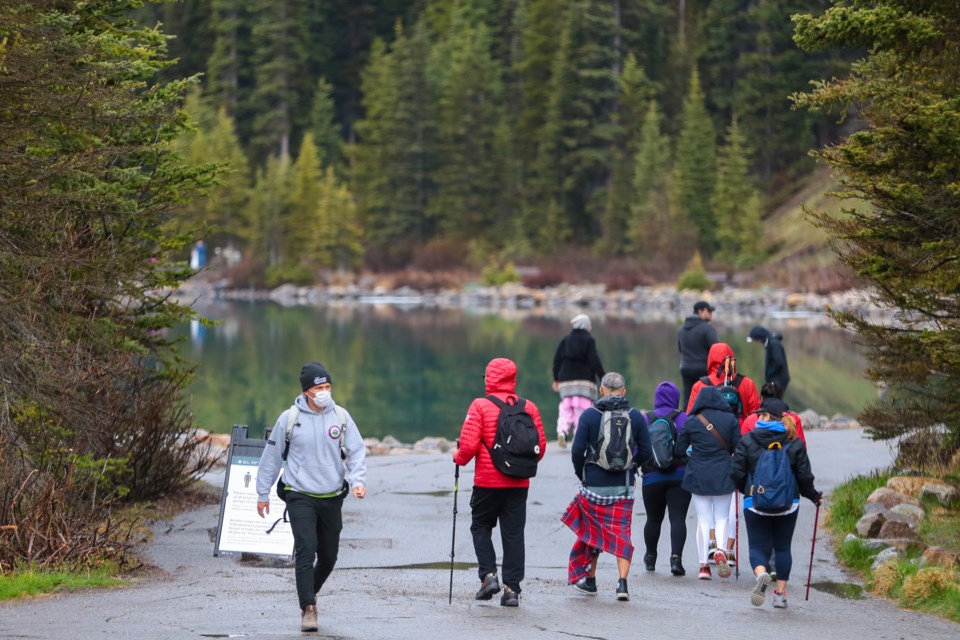BANFF NATIONAL PARK – As the province enters its fourth month of a pandemic and begins to slowly reopen the economy, the Bow Valley is seeing more visitors, including several Americans who are facing up to $1,200 in individual fines after not following provincial health guidelines.
Alberta RCMP handed out more than $8,000 in fines last week in Banff National Park after seven individuals travelling from the U.S. were charged under the Public Health Act with failing to comply with the chief medical officer of health's orders.
"They were U.S. residents who were doing discretionary activities, tourist activities such as hiking," said Fraser Logan, Alberta RCMP media relations manager.
The seven were fined in and around the Lake Louise area after RCMP investigated reports of out-of-province licence plates.
- RELATED: Banff lifts state of local emergency
"We are always trying to educate before we enforce and it is always up to the officer's discretion on what to do – it doesn't matter if they are from the U.S. or Canadians," Logan said.
With the economy slowly reopening and Alberta recently starting phase two of its economic relaunch strategy, officials want to remind residents and visitors there are still several public health guidelines in place.
The guidelines include physical distancing, meaning keeping at least two metres from others who are not in your immediate or cohort household, mandatory self-isolating if you are presenting symptoms, and mandatory 14-day quarantine for any travellers entering Canada.
"Even if we are feeling healthy and symptom-free, we all need to continue as though we could spread the virus and catch it from others," Alberta's Chief Medical Officer of Health Dr. Deena Hinshaw said at a press conference last week. "We remain each other's best defense against the virus."
Canada Border Service Agency officials said the government of Canada has implemented travel restrictions for all modes of transportation to all optional or discretionary travel at the Canadian-U.S. border since March 21, which was recently extended to July 21.
Officials said healthy, non-symptomatic foreign nationals travelling through Canada for non-discretionary purposes, such as returning home to Alaska, are allowed to travel through Canada.
"Upon arrival at the port of entry, a traveller seeking to transit through Canada to Alaska will be required to substantiate their purpose for going to Alaska. Only in circumstances where the traveller is considered to be transiting through to Alaska for a non-discretionary purpose will be admitted to Canada," Canada Border Services Agency (CBSA) spokesperson Louis-Carl Brissette Lesage said in an emailed statement.
"Should an officer have any doubts with regards to the traveller’s intended purpose, the traveller will be required to prove/substantiate their purpose of travel."
The CBSA said once a traveller is admitted to travel through Canada, they are not allowed to make any unnecessary stops and are instructed to avoid contact with others while in transit.
Logan said he is aware of one incident where American visitors stopped to stretch their legs, but noted the family was travelling with small children and were given a warning.
"If you are caught and symptomatic, you are going to be forced into quarantine, but we are mainly focused on education," Logan said.
Banff and Canmore RCMP echoed the same sentiments last week after rumours on social media circulated regarding Americans "sneaking into" the national park.
Please share this special message to #YYC and #YEG, welcoming you back to Banff, as we safely open our doors pic.twitter.com/M8ueH7Y0QP
— Banff Town (@Banff_Town) June 10, 2020
The Outlook spoke to Banff RCMP Sgt. Michael Buxton-Carr who said the issue did not appear to be widespread, but instead appeared to be an isolated incident getting widespread attention.
"We are not hunting for U.S. licence plates – we know there are people in the country who were here before the pandemic hit and there are some people who have already completed their quarantine," Buxton-Carr said.
Banff RCMP confirmed it has yet to lay any fines out of the Banff detachment.
Canmore RCMP also received reports of out-of-country licence plates last week but also did not fine any individuals.
The RCMP media relations manager said since the fines are under the provincial Public Health Act, a number of official agencies can lay fines including bylaw officers, peace officers and provincial fish and wildlife officers.
"We are just asking anyone travelling this summer to educate themselves on local public guidelines ... anyone before they hit the road to do the research to mitigate any chances of getting public health violations," Logan said.
The CBSA said providing false information to a border services officer is considered misrepresentation, which could lead to denied entry and a ban on returning to Canada.
Failure to comply with current border restrictions is considered an offence under the Quarantine Act and could lead to up to $750,000 in fines, or imprisonment for up to six months.
Follow me on Twitter @JennaDulewich




